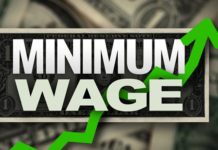Politicians are floating the idea of doubling the Federal Minimum Wage (MW), from its current level of $7.30/hour (for non-tipped, non-family, non-farm employees) to $15/per hour. What are the Economic and societal impacts of such a change? Let’s dig.
The first thing to note: labor is just another product or service, subject to the same laws of Supply and Demand as any other. That market is defined as the low-skilled or unskilled labor pool of any particular area. If the Supply of Minimum Wage-applicable labor increases (in a given geographical area), the Demand decreases. If the Supply decreases, Demand increases. The optimal price point (wages) is where the Supply equals Demand.
Except government interferes in this market, via installing a price floor. If the price floor is below the optimal price point, it is not relevant, as the floor is below what employers are already paying. If the price floor is above the optimal price point (which is the very point of establishing a price floor), it creates an unnatural excess Supply, since employers do not want (Demand) that quantity at that artificially high price. If Supply was less (in a given area), the Demand would increase, naturally arriving at an optimal price at or over the price floor. That dynamic is proven in North Dakota: there simply aren’t enough low-skilled or unskilled workers to fill Demand, so the effective ‘minimum wage’ is several dollars higher than the assigned Minimum Wage.
But for most areas, the Supply of minimum wage-applicable labor increases with every high school graduating class, or those hitting the truancy age to drop out. New entries into the working world, many of these folks are learning, for the first time, how to find a job, how to show up, how to clock in and out, and receive their first paychecks ever. Some experienced this entry before graduating, so they have a leg up on the rookies. Many of these folks have learned things that separate themselves from the ‘low-skilled’ market, due to acquiring useful skills to an employer. They then exit the low-skilled or unskilled market, and enter the skilled market. In addition to high school graduates (or drop-outs), many Seniors enter the minimum wage market, to supplement Social Security benefits.
So, what happens when government mandates a $15/hour MW? Note that even at the existing MW, many young, first-time employees cannot find work—unemployment for this sector has never been zero. When you raise the price of any good or service—especially a rapid, large increase—the Demand for such a good or service decreases. In the labor world, fewer jobs are available—increased unemployment. Employers will require fewer employees to do more tasks each, rather than increase the cost to staff workers. In an attempt to recover increased labor costs, some businesses may attempt to increase prices (not an option in many markets). Larger companies may decide to invest in automation equipment, to avoid employee costs entirely long-term—further deepening the increased level of unemployment for that sector.
From a non-Economic (societal) view, this policy of doubling MW, without an associated increase in productivity for the employer, will do exactly the opposite of its intentions. Yes, those working will have more spending money, due to increased wages. And government will collect more taxes via those larger numbers. But that is of zero value to those that cannot find a job. And the ripple effect of doubling wages at the bottom of the wage scale impacts higher wage groups. Skilled folks, many now at or near the $15/hour range, will either want a commensurate raise, or will be disgruntled to be paid the same as low-skilled or unskilled. Dampening the incentive to improve to ‘skilled’ is never a positive thing. And many union contracts are paid with MW as a factor in wage calculations—well-paid union members may get a hefty raise, across the board, through no fault of their own. This type of wage inflation eventually hits prices and unemployment rates for the higher income strata just as it does the entry level. Cynical people may believe that the impact to union workers may be the stealth reasoning for increasing MW in the first place. Bottom line: doubling MW is a political ploy, that very likely damages the very folks it was purported to help. Because politics is the antithesis of Economics—those that promise things almost never have to pay for the impacts of their decisions. I hope the increased vote totals were worth it.
Welcome!Log into your account























